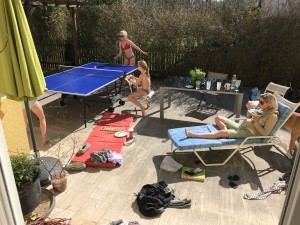I won’t cover the specifics of the pandemic too much; many excellent books will likely be written to document that.
After a highly infectious coronavirus had spread from a bat (most likely) to a human in the Wuhan province of China at the start of December 2019, it only took weeks for the aggressive virus to widely spread. By the middle of January, when China was well aware of the issue, the virus had escaped China but the world had not been notified of the catastrophe unfolding in China.
Despite much Government attention being given to hypothetical pandemic preparations, the world was slow to respond once the Chinese health community starting providing necessary data (in particular the genome of the virus). By the end of January, after having had only a few weeks to study the virus, most expert epidemiologists and virologists were sounding the alarm. All governments were slow to respond. While China had begun a massive (~750 million people) forced quarantine, governments focused on identifying citizens who had traveled to China. This was foolish. The virus, as explained by the experts, was highly contagious and community spread (people having the virus who had never been to China) was already taking place. It would later be understood that the number of infected people was essentially doubling every week, an unsustainable rate for any population with a vulnerable demographic. And yet governments were only looking for people who had traveled to China…
The entire month of February was lost by governments not taking the experts seriously; by gross negligence on the part of the CDC specific to testing; and by economic forces (the stock market was at an all time high, and shielding the long term economy by strict social distancing and self-quarantining early on – which short term would have slowed the economy – was not a priority). With a dire availability of test kits, Governments were wholly in the dark as to the extent of the contagion, with the number of people dying or requiring ICU care the only metric governments had to go on.
Within the US, with the complete lack of direction being provided at the national level (again, books will be written to shed light on the incompetence shown), states, cities, and companies started acting on their own in the public interest.
On March 9th, as the Trump administration was saying that everything was OK and the contagion would “go away” despite the numbers slowly rising (slowly, again, due to lack of testing), Cisco Headquarters in San Jose (affecting maybe 15,000 people?) forced people to work from home. This is about the time when constructive actions started to happen, globally.
– On March 11 Cisco Europe also instituted a work from home policy (affecting maybe another 15,000 people).
– On March 11 Italy essentially shut down, with 12,462 total cases and 827 dead. 10 days later, despite the lockdown, Italy would have 53,578 total cases and 4,825 dead. For yet unknown reasons (could be the virus or the culture [older people living with younger people in the same family] or not having Communist tools to totally control their population) Italy would quickly surpass China with the highest number of deaths.
– On March 16 Austria essentially closes down.
– On March 20 California essentially closes down.
– etc
The goal was no longer containment; that battle had not been lost, but rather had never been fought. The goal now was mitigation, and specifically to “flatten the curve”, which meant to slow the progression of the COVID-19 disease (caused by this new coronavirus SARS-CoV-2) so that the health care industry would not be overwhelmed, resulting in inadequate care to those who most needed it and therefore more deaths than necessary.
Think about that for a second: the game was over. People were essentially going to be accounted for in 3 ways:
1. Not yet exposed (the assumption is that eventually every human on the planet would be exposed)
2. Exposed (might be very sick, or just sick, or asymptomatic with no symptoms at all)
3. Immune – meaning they had the disease, but are now free from contracting the disease again (at least for 12-24 months, more research required)
So the goal is to slow (but not stop) #1 to allow for sufficient care to be given to the most sick (#2) while ultimately using an antibody test to confirm who (#3) has immunity and can go back to restart the economy.
One example of the many things I’ve read.
http://lifeofannika.com/year/16/images/Salzburg/March/COVID-19/SARS-CoV-2.pdf
From that paper:
The next month is critical: March 16 to April 16. It’s not so dangerous in terms of getting infected personally, but
important in terms of demonstrating we can reduce R0 or increase doubling time.
If we are still doubling each week on April 16, we have only another month to get a second chance.
If that doesn’t work by May 16, there would be no third chance. We would have to immediately clamp down to
avoid hospital overflow. This would require Wuhan-like measures such as central quarantine for sick and enforced
home-isolation for everyone else.
Speaking of the economy, the hit has been brutal.

Amazingly, I’m lucky in this regard. In December 2019 the stock market was on fire (about 29% up for the year) which suggested (to me) that a correction was near. But more importantly the Trump impeachment, an election year, uncertainty in North Korea…I decided to get out of the market by doing what is otherwise completely irrational and NEVER recommended, especially for your long term 401K retirement funds. To be clear: I moved my entire 401K out of stocks and into a US Debt Bond. 3 months later after having sold the stock market is down 29% (for a reason that I never saw coming).
This can’t be emphasized enough. Given my age (57 next month) I am actively considering retirement in the next 5 years. Had I not moved my 401K out of stocks, those plans would be up in smoke. That goes for all other people in my age range, which means millions of people who were at the doorstep of retirement are now looking at an entirely new future, yet unknown. The social and political implications are huge; there will be a degree of bitterness leading to more populist rage than I can imagine.
Here at home, it’s been nearly 7 days since schools closed and we went to a stay-at-home policy. Rups and Inge were here for Andrea’s Birthday, but left early (March 15) before the border between Germany and Austria was to close (March 16). It’s actually been a treat; an intense amount of time together, with the girls getting bored and frustrated at times but they are old enough to resign themselves to this new reality, understanding that the entire world is doing the same. We hang out together, play games, talk, hikes, bike rides, dog walks…pretty cool. Girls seem relaxed, not anxious about all that’s happening. Andrea talks about COVID-19 most of the time, which I don’t think is healthy, especially for the girls. Maybe she’ll get bored with the news soon, too.
Our Spring trip plans to Greece April 4-13 isn’t looking good, which is a huge bummer. I wish I could say it will just be delayed, but I suspect that the pandemic has truncated this entire Austrian adventure. I can easily imagine:
– We shelter in place for months
– The girls don’t return to school, but instead finish the year online, negatively affecting their language immersion.
– The girls don’t see Mimi and Opa for months
– No family vacation to Greece or anywhere else
– Lech in July doesn’t happen
– Andrea’s August plans to northern Germany for Opa’s 80th birthday don’t happen
The (or my) goal for the girls during this year long adventure was language immersion and quality time with grandparents. This triage exercise is negating both of those goals, which really is a shame, a costly loss.
Salzburg has essentially been closed down since Monday. To see what an international tourist destination looks like, take a gander at http://lifeofannika.com/year/16/images/Salzburg/March/COVID-19/
Until then, we will ping-pong on…

Life in the time of COVID-19


